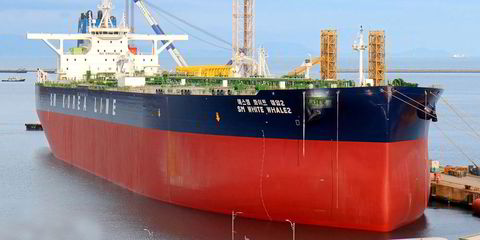Terry Macalister a regular contributor to TradeWinds and former energy editor of the UK’s highly respected Guardian newspaper, is always stimulating.
And his blistering attack on the use of open registers, squeezing every ounce of juice from information dumps such as the Paradise and Panama papers, would sit comfortably in that paper's most anti-establishment pages.
The Queen of England’s financial affairs, and world leaders’ offshore accounts. And now — wait for it — let’s add some plutocratic shipowners to the brew, with or without their stovepipe hats.
One of the founding principles of the UK's Guardian newspaper is "comment is free, but facts are sacred". But the broadside in TradeWinds on 17 November contained a number of very questionable assertions.
It was suggested that shipping should not use the open registry system because people who have heard about the Paradise Papers might think shipowners are somehow guilty by association.
The article conceded shipowners are not doing anything illegal, yet seemed to imply that the industry is doing something immoral or wrong, while failing to explain precisely why.
In the 21st century, there is nothing inherently unusual about an international ship registration system — 60% of shipping activity now serves the maritime trade of emerging economies, which also now own nearly half of the world’s tonnage.

Shipowners using open registers may not pay corporation tax. But this is the same in many other jurisdictions, including Europe, where shipowners of course pay tonnage taxes, even when they are making a loss.
Those investors that inject billions of dollars into shipping, with all the risks of volatile and cyclical markets, are frequently drawn from more than one country, simply because shipping projects are so big.
So it makes sense to use offshore centres, with their high levels of service and maritime expertise, to keep capital movements as simple as possible when they are already extremely complicated.
That said, many OECD flags apply similar tax regimes, and successful flags such as the UK, for example, have few beneficial shipowners that are actually domiciled in the UK.
The eight largest open registers now administer almost two thirds of the world fleet. And all of these feature on the "white lists" of quality low-risk flags published by the Paris and Tokyo MOUs on port state control.
All have undergone voluntary audits under the IMO member state audit scheme.
And all have ratified every principal maritime convention currently in force, governing safety, pollution prevention and seafarers’ employment standards; whereas many of these instruments have still not yet been ratified by a number of OECD nations.
There were other weaknesses in Macalister’s argument.
Chinese shipowners also now make use of open registers because they too are part of the global shipping industry, working with non-Chinese partners.
And the International Transport Workers' Federation (ITF) hardly lacks political power. The ITF is probably the most powerful global trade union ever, and has a direct impact on the pay and working conditions of almost two million seafarers worldwide.
Ironically, this is partly because shipowners pay the ITF around $30m per year for the privilege of using open registers without having their ships boycotted by ITF’s stevedore affiliates.
While the International Chamber of Shipping (ICS) continues to question the relevance of the ITF flag of convenience campaign, it respects the union as a responsible and influential social partner, and co-operates on many issues precisely because it wields such political clout.
In 2015, the ICS dedicated the final session of its annual conference to this very issue, with senior representatives from the ITF and major open registers sitting on the same panel.
TradeWinds could have covered that, but the juice to be squeezed from it would have been more refined.




